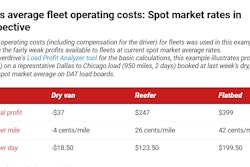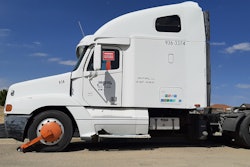Trucking news and briefs for Friday, July 4, 2025:
Heavy Vehicle Use Tax filing period now open
The annual filing period for IRS Form 2290, the Heavy Vehicle Use Tax (HVUT), officially opened on July 1.
For most owner-operators and fleets of all sizes, IRS Form 2290 is due by Sept. 2. Form 2290 must be filed each year for all vehicles that operate on public highways in the United States with a taxable gross weight of 55,000 pounds or more. Canada- and Mexico-based carriers are also responsible for paying HVUT for taxable vehicles operated in the United States.
Plenty information about the HVUT filing process can be found in Overdrive’s Partners in Business playbook.
 Partners in Business is a collaboration between Overdrive and ATBS offering small fleet and owner-op strategies for long-term success, for 2025 in a mobile-friendly format. Browse the PIB playbook's content library via this link.
Partners in Business is a collaboration between Overdrive and ATBS offering small fleet and owner-op strategies for long-term success, for 2025 in a mobile-friendly format. Browse the PIB playbook's content library via this link.
J.J Keller & Associates also announced it’s helping fleets meet the Sept. 2 deadline with some tips, along with its 2290online e-filing solution.
“Filing Form 2290 doesn’t need to be a stressful experience,” said Steve Murray, executive vice president of professional services at J. J. Keller. “The key is understanding the requirements surrounding this tax that can get fleets in trouble if they’re not careful.”

The firm offered the following 10 tips for HVUT filing:
- Make sure you have an Employer Identification Number (EIN). You cannot use your Social Security Number. Obtaining a new EIN can take a few weeks, so don’t wait until the last minute.
- File on time. Penalties and interest can accrue when taxes aren’t filed on time. Proof of payment is required when registering your trucks.
- Check your work. Quick checks can help prevent amended or corrected returns.
- E-file. Electronic tax filing is required if you have 25 or more vehicles, though smaller fleets can also benefit from the convenience and speed of e-filing.
- Use a trustworthy firm to help you file. Only trust an IRS-authorized e-file provider. Don’t fall victim to scams or unscrupulous third-party filers.
- Suspend the tax if you can. If operating a taxable vehicle 5,000 miles or less, you can suspend the tax. You’ll file the HVUT, but you pay no tax.
- Be sure to claim your credits or refunds. Credits can be claimed for vehicles that were sold, destroyed or stolen.
- Know when you might need to file again. Additional filings are required if you add a taxable vehicle to your fleet during the tax year.
- Know your options for payment. The IRS accepts electronic funds withdrawal, Electronic Federal Tax Payment System (EFTPS), credit or debit card payments, and checks or money orders.
- Keep proper records. Retain filing records for at least three years after the date the tax is due or paid, whichever is later.
In addition to offering e-filing, J. J. Keller now also offers what it calls the File-For-Me Service. According to Murray, this is a personalized, full-service IRS Form 2290 filing solution where J. J. Keller’s specialists manage every step of the process on a company’s behalf.
[Related: 2290 tax season: Tips for truckers on filing, more]
Fleet petitions FMCSA to operate under ag HOS regs
The Federal Motor Carrier Safety Administration is accepting public feedback on an exemption request from Protein Transport of Indiana, a fleet whose operation involves the transportation of chicken products.
The company has requested an exception to allow it to operate under the agricultural operations provision in the hours of service (HOS) rules, which provides regulatory relief from the requirements for drivers transporting certain agricultural commodities within a 150 air-mile radius from the source of the agricultural commodities.
Protein Transport in its request said its drivers travel to various agricultural facilities to process hens that have reached the end of their productive lives. Once the hens are processed onsite, the company transports that product to processing facilities to be used to make pet food and hog feed. Protein Transport is requesting that the chicken products it transports be considered an agricultural commodity so that it can operate under the agricultural commodity exemption.
The company said it believes the exemption would not compromise safety because it will check and monitor its power units every 10,000 miles, and perform an oil change every 15,000 miles. It added that by prioritizing operations within a 150-mile radius, its drivers will spend less time on the road covering fewer miles, thereby reducing the overall freight mileage by 20,000 to 30,000 miles each quarter of the year. The company further added it will continue to prioritize safety over transportation of the load because its drivers have been instructed to inform management when they need to take a break for any reason.
FMCSA is accepting comments on the request here through July 31.
[Related: DOT set to eliminate speed-limiter mandate, keep pre-2000 ELD exemption in place]









